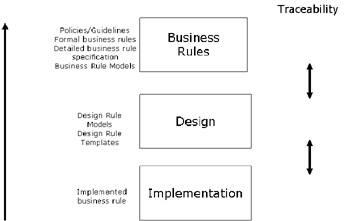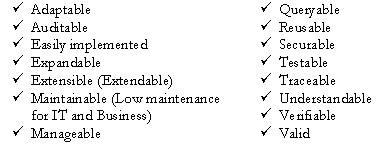Introduction
As a business rules approach becomes more widely accepted as a standard practice for business systems development, the concepts, methodologies, and tools that support this approach will need to mature and evolve further. I would like to introduce a new concept that looks at business rules from a point of view of sustainability. In other words, I’m coining this concept with the term “Sustainable Business Rules”. In part one of this three part article, I will explore this concept and introduce the characteristics of sustainable business rules. In part two of the article, I will explore the characteristics in more depth. In part three, I will present some thoughts on what will be needed to achieve the concept, including some challenges for the business rules vendors of rules management tools, rule methodologies, and rule engines.
What is Sustainability?
Sustainability is one of those buzzwords that is used frequently but is not always understood. It is most often used when referring to development of property and land, thus sustainable development. “Sustainability is the commonsense notion that long-term prosperity and ecological health not only go together, they depend on one another. Sustainability means long-term cultural, ecologic and economic health and vitality.”1
From Wikipedia, the free encyclopedia:
“Sustainability is a systemic concept, relating to the continuity of economic, social, institutional and environmental aspects of human society, as well as the non-human environment. It is intended to be a means of configuring civilization and human activity so that society, its members and its economies are able to meet their needs and express their greatest potential in the present, while preserving biodiversity and natural ecosystems, and planning and acting for the ability to maintain these ideals in a very long term. Sustainability affects every level of organization, from the local neighbourhood to the entire planet.”2
A Google search provides, in addition, such things as sustainable communities, sustainable forestry, sustainable eco-travel, sustainable agriculture, sustainable design, sustainable building, sustainable economy, sustainable cities, sustainable energy, and more…..There are research centers, alliances, institutes that look at sustainability in many different ways.
How does sustainability apply to Business Rules?
When one looks at the intentions of a business rules approach, it seems like common sense to me to look at how the concept of sustainability can be applied to business rules. I have concluded that “Sustainable Business Rules” are rules that:
- Can be managed, maintained, supported, and will hold up over time.
- Provide the necessities of the business and can be nurtured as business changes.
- Remain affirmed as valid and can be strengthened with new facts.
Business Rules become “live” artifacts, not just some words in documentation, or code stuck inside some program, or expressions in the subject matter’s head. Through the various levels of abstraction in which the business rule can be expressed, there is synchronization thru the life cycle of the business rule. So if at the lowest level of abstraction, the implemented business rule is changed, the business rule captured in natural language at a fairly high level of abstraction may be impacted and this is known….as well as everything in between….and vice versa. This is the expectation from the beginning…not an afterthought of wouldn’t it be nice if it could….. The Business Rules Approach is the foundation and framework to achieve sustainable business rules….and guess what: it is hard work to get there but worth it when you get there!

Figure 1 – Levels of Abstraction
Note: I refer to the natural language business rules as the “Formal business rules” as to me these are the real rules as expressed by the business. Some others refer to these as “Informal business rules” I don’t know what is informal about them – they are what they are, hopefully expressed in the formal terminology and language (terms and facts) of the business. I equate what others call “Formal business rules” as “Detailed business rule specification”.
We can’t agree on terms!!
What are the characteristics of Sustainable Business Rules?
Sustainable Business Rules should have at least the following characteristics:

Summary
The true test of a business rules approach is what happens during and after implementation.
- Can the rules be easily adapted to rapid changes in the business?
- Can the business areas really be the stewards for the rules?
- Has the cycle for changes to rules been accelerated significantly?
- Has the company achieved the expected Return On Investment from a business rules approach?
- Does the business really understand what the rules are at both a business level and implementation level, as well as which rules are executing and which rules are not and why?
- Can obsolete rules be easily identified?
- Can rule changes be easily identified?
- Can rule changes be easily tested?
Ask yourself these and other questions about your business rules to determine if your business rules are sustainable.
In part two of the article, I will look at the characteristics of Sustainable Business Rules in more detail.
1Sustainability 101
2Wikipedia
















